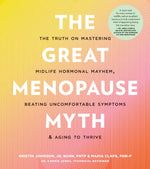
Menopause and Women’s Health
A guest post by Kristin Johnson and Maria Claps of Wise+Well
Menopause is having its moment. In fact, October is World Menopause Awareness Month, but did you know that only 54 percent of women can correctly define menopause? More than simply an end to fertility, menopause is a time when a woman’s health can spin out of control. The hormonal shifts of menopause impact everything from body composition and immune system function to increased risk of chronic health conditions such as cancer, diabetes, dementia, heart disease, and osteoporosis.
For decades, however, women have been misled about menopause. We have been told it is just the loss of our menstrual periods (and thus fertility). We have been told that it is “natural” as if it is optimal and our body will just magically adjust to it. We have been told it’s just about symptoms and if you have none, then all is good and there is nothing to worry about. We have been told that the best way to handle symptoms, if you have them, is via birth control pills, herbs, cognitive behavioral therapy, SSRIs, sleep aids, statins and so many other concerning interventions.
If you’re lucky enough to even be offered menopause treatment, traditional protocols, based on decades old shoddy science and erroneous research conclusions, have gotten it wrong. Badly wrong. For years, conventional wisdom—and medical practice—have told women nothing needs to change in their lifestyle or healthcare at midlife, and they should just white-knuckle the discomfort of hot flashes, sleeplessness, weight gain and loss of muscle mass, mood swings, painful sex, joint pain, and incontinence, as if it will all just (magically) go away in a decade or two. All of this just obfuscates the truth and has contributed to a declining health span as women age. This is not okay. One area that rarely is discussed as being dramatically impacted by the loss of female sex hormones in the midlife transition is the gut and our microbiome.
The gut microbiome, the collection of all microbes, such as bacteria, fungi, viruses, and their genes that live naturally on and inside the human body, plays a critical role in our health via direct influence on our metabolism, body weight, immune system, mood, and appetite. Female sex hormone levels, particularly of estradiol, globally influence the composition of all microbes throughout the body, but especially in the gut. In fact, an estradiol–gut microbiome axis exists with a two-way relationship that involves “cross -talk” between estradiol and the GI gastrointestinal tract. The loss of estradiol in the menopausal transition and subsequent alteration of gut function and microbiome play a significant role in driving poor bowel health and increased weight gain often seen in midlife women. In fact, a decrease in estradiol and its receptors contributes to the progression of a number of GI diseases, including gastroesophageal reflux (GERD), esophageal cancer, peptic ulcers, gastric cancer, inflammatory bowel disease, irritable bowel syndrome, and colon and breast cancer. For these reasons, it is imperative that midlife women or any woman experiencing low sex hormones pay her gut some attention.
Given all the myriad ways women’s health is negatively impacted during the menopausal transition, we have written a comprehensive guide based on the latest research in aging, women’s health, and HRT that dispels the misinformation and provides education to help you thrive. Our book, The Great Menopause Myth, is your comprehensive resource for optimized menopause care.
The Great Menopause Myth shows you how to age wise and well at midlife and beyond. Learn actionable steps and guidelines to curate an optimized menopause regimen based on your unique health considerations.
- Nutrition, exercise, and sleep hygiene at midlife: Best practices for aging healthy
- Thyropause, fatty liver disease, and gut health: The overlooked systems that need attention during menopause
- HRT or MHT: What is the difference and does it matter? (Hint: It does!!)
- Not all HRT is created equal: Low dose or physiologic? Static or rhythmic? Continuous or cyclic? Creams, gels, patches, injections, pills, or pellets? Learn how to choose the best option for you.
- When HRT is truly not an option: Supplements and integrative options for menopause care.
Want more info on working with us so you can get individualized guidance? Please reach out to us at hello@wiseandwell.me